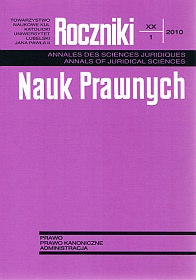Legal Aspects of Data Exchange in Connection with the Computerization of Register Offices
Abstract
The idea of open borders, social and economic integration, as well as democratic processes will contribute to a greater mobility of the European citizens. Ease and freedom of movement, possibility of taking up employment abroad and therefore developing social links all systematically increase the frequency of events of international character which affect the marital state of persons. This trend has been observed in Poland for a long period of time, hence there often arise questions what to do for the citizens to be able to solve their family problems in register offices of their own accord and without unnecessary burden of bureaucracy despite apparent legal conflicts.
Certainly, international operations concerning registrations with register offices at all levels must be unified, ranging from international bodies, such as the International Commission on Civil Status, to local registrars is particular countries. With a view to using IT and other new technologies efficiently, we are faced with new challenges in terms of standardization and harmonization of deeds and documents, electronic information exchange and its protection. In 2004, the Ministry of Internal Affairs and Administration came up with the project called “Restructuring and integration of the national registers PESEL2”. Since the Ministry evaluated the computerization of register offices as unsatisfactory and slow, the construction of the Central Registry of Civil Status was postponed for the years 2009-2010 and is to be realized as part of “pl.ID – Polish ID card” project. This will allow for an introduction of the electronic identity card which will enable the holder to verify his/her identity in the IT systems of public administration. The Central Registry of Civil Status is scheduled to start at the beginning of 2011, and restructuring and integration of the existing register offices will take place. The goal of the project “pl.ID – Polish ID card” is, among others, to restructure the existing registers (PESEL – Universal Electronic System for Registration of the Population, OEW – National Registry of Issued and Lost IDs), the creation of new ones (CROASC – Central Registry of Copies of Personal Status Certificates) and their integration.
Copyright (c) 2010 Roczniki Nauk Prawnych

This work is licensed under a Creative Commons Attribution-NonCommercial-NoDerivatives 4.0 International License.


